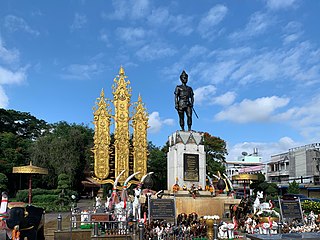
Chiang Rai is one of Thailand's seventy-six provinces, which lies in upper northern Thailand and is Thailand's northernmost province. It is bordered by the Shan State of Myanmar to the north, Bokeo province of Laos to the east, Phayao to the south, Lampang to the southwest, and Chiang Mai to the west. The provinces is linked to Houayxay Laos by the Fourth Thai–Lao Friendship Bridge that spans the Mekong.

Chiang Mai is the largest Province (changwat) of Thailand by area. It lies in upper northern Thailand and has a population of 1.78 million people. It is bordered by Chiang Rai to the northeast, Lampang and Lamphun to the south, Tak to the southwest, Mae Hong Son to the west, and Shan State of Burma to the north. The capital, Chiang Mai, is 685 kilometres (426 mi) north of Bangkok.

Chiang Mai is the largest city in northern Thailand, the capital of Chiang Mai province and the second largest city in Thailand. It is 700 km (435 mi) north of Bangkok in a mountainous region called the Thai highlands and has a population of 1.2 million people as of 2022, which is more than 66 percent of the total population of Chiang Mai province.

Lampang is one of Thailand's seventy-six provinces (changwat), situated in upper northern Thailand. The old name of Lampang was Khelang Nakhon.

A mahout is an elephant rider, trainer, or keeper. Mahouts were used since antiquity for both civilian and military use. Traditionally, mahouts came from ethnic groups with generations of elephant keeping experience, with a mahout retaining his elephant throughout its working life or service years.

Lampang, also called Nakhon Lampang to differentiate from Lampang province, is the third largest city in northern Thailand and capital of Lampang province and the Mueang Lampang district. Traditional names for Lampang include Wiang Lakon and Khelang Nakhon. The city is a trading and transportation center. Lampang lies 601 km (373 mi) north of Bangkok and 101 km (63 mi) southeast of Chiang Mai.

Tourism is an economic contributor to the Kingdom of Thailand. Estimates of tourism revenue directly contributing to the GDP of 12 trillion baht range from one trillion baht (2013) 2.53 trillion baht (2016), the equivalent of 9% to 17.7% of GDP. When including indirect travel and tourism receipts, the 2014 total is estimated to be the equivalent of 19.3% of Thailand's GDP. According to the secretary-general of the Office of the National Economic and Social Development Council in 2019, projections indicate the tourism sector will account for 30% of GDP by 2030, up from 20% in 2019, Thailand expects to receive 80 million visitors in 2027.
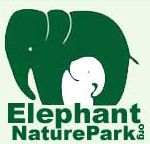
Elephant Nature Park is a sanctuary and rescue centre for elephants in Mae Taeng District, Chiang Mai province, northern Thailand, approximately 60 kilometres (37 mi) from Chiang Mai city, co-founded by Sangduen "Lek" Chailert. In 2013, Erawan Elephant Retirement Park opened in western Thailand as an offshoot. By 2016, there were branch parks in Surin and in Cambodia, and there were plans to open a fifth park in Phuket. By then, the work was coordinated by the Save Elephant Foundation.

Pinnawala Elephant Orphanage, is a captive breeding and conservation institute for wild Asian elephants located at Pinnawala village, 13 km (8.1 mi) northeast of Kegalle town in Sabaragamuwa Province of Sri Lanka. Pinnawala has the largest herd of captive elephants in the world. In 2023, there were 71 elephants, including 30 males and 41 females from 3 generations, living in Pinnawala.
Therdchai Jivacate is a Thai orthopedic surgeon and inventor known for his humanitarian activities in providing free prosthetic limbs to impoverished amputees, and for his development of techniques allowing low-cost, high-quality prostheses to be made from local materials. The activities of the Prostheses Foundation, which he founded in 1992 under royal sponsorship from the Princess Mother Srinagarindra, have expanded beyond the borders of Thailand to Malaysia, Laos, and Burma. Jivacate has established Thailand's first and only educational institution of occupational therapy at Chiang Mai University. He has also created an educational programme for children suffering from chronic diseases at Maharaj Hospital in Nakhon Ratchasima. In 2008, he was given the Ramon Magsaysay Award for Public Service.

Chiang Mai Zoo and Aquarium is a 200-acre (81 ha) zoo on Huay Kaew Road in Chiang Mai Province, Thailand, just west of Chiang Mai University. It is the first commercial zoo in northern Thailand, established on 16 June 1977.
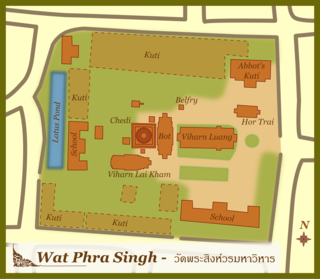
Wat Phra Singh is a Buddhist temple in Chiang Mai, northern Thailand. King Ananda Mahidol, bestowed upon it the status of Royal temple of the first grade in 1935.
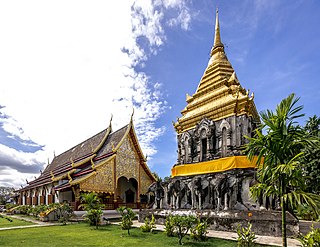
Wat Chiang Man is a Buddhist temple inside the old city of Chiang Mai, in northern Thailand.

Chiang Mai Night Safari is located in the sub-district of Mae Hia in Chiang Mai, and the district Nong Khwai, and the district Hang Dong in Thailand. It is a zoo that is located to the west of Royal Flora Ratchaphruek 2006. Chiang Mai Night Safari is a government property under the Zoological Park Organization. The park was opened for the first time on 18 November 2005 and opened officially on the 6 February 2006. Initially, it was under Designated Areas for Sustainable Tourism Administration and the Pinganakorn Development Agency. Chiang Mai Night Safari is believed to be the first nocturnal zoo in Thailand and is the largest in the world, covering an area of 819 Rai or approximately 327 acres. Presently Chiang Mai Night Safari has changed its opening hours allowing entry for visitors during both the day and night hours.

Chuang Chuang and Lin Hui were two giant pandas from Sichuan, China on loan to Chiang Mai Zoo in Chiang Mai, Thailand.

The Khun Tan Range is a mountain range that occupies a central position in Northern Thailand. Most of the range is located in Chiang Mai, western Chiang Rai, Lampang and Lamphun Provinces.
Millennium Elephant Foundation (MEF) is an organization and charity set up to rescue and care for captive Asian elephants in Sri Lanka. The foundation is situated on a 15-acre estate by the name of Samaragiri, which is located 10 km (6.2 mi) northwest of Kegalle, within the Sabaragamuwa Province of Sri Lanka. As of 2019 there are 10 elephants that either permanently or temporarily reside at the sanctuary. These elephants are taken care of by 13 local mahouts and a number of foreign volunteers.

On 26 May 1998, the Thai government declared the 13th of March to annually be the Thai National Elephant Day or Chang Thai Day. The observance was suggested by the Asian Elephant Foundation of Thailand and submitted to the Coordinating Subcommittee for the Conservation of Thai Elephants. The date was chosen because the Royal Forest Department designated the white elephant as the national animal of Thailand on 13 March 1963.
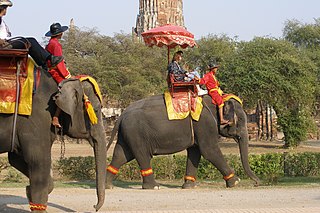
The elephant has been a contributor to Thai society and its icon for many centuries. The elephant has had a considerable impact on Thai culture. The Thai elephant is the official national animal of Thailand. The elephant found in Thailand is the Indian elephant, a subspecies of the Asian elephant. In the early-20th century there were an estimated 100,000 captive elephants in Thailand. In mid-2007 there were an estimated 3,456 captive elephants left in Thailand and roughly a thousand wild elephants. By 2017 the number of captive elephants had risen to an estimated 3,783. The elephant became an endangered species in Thailand in 1986.

When Elephants Were Young is a 2015 Canadian documentary film directed by World Elephant Day Co-founder Patricia Sims and narrated by William Shatner. It follows the story of Wok and his young elephant Nong Mai, as they street beg in Bangkok until the opportunity comes to release the elephant to the wild. The film premiered at the Whistler Film Festival on December 5, 2015.



















